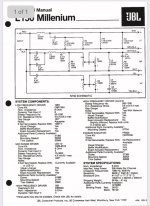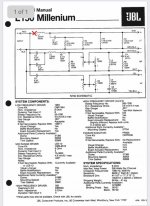Hello All,
I’ve been feeling the need to tinker or experiment with bi-amping a pair of speakers. I’m currently using my M2-x as my main amplifier but also have my DIY Aleph J which is sitting around waiting for it’s turn to be put back into service. I’m asking for opinions as to which one would be best used in the Mid/Upper range and which would be better suited for the lower frequency duty and why that might be. I do realize they have different input sensitivities for their respective rated outputs so I’d probably need an electronic crossover to compensate.
Any suggestions or opinions would be greatly appreciated!
Thanks
I’ve been feeling the need to tinker or experiment with bi-amping a pair of speakers. I’m currently using my M2-x as my main amplifier but also have my DIY Aleph J which is sitting around waiting for it’s turn to be put back into service. I’m asking for opinions as to which one would be best used in the Mid/Upper range and which would be better suited for the lower frequency duty and why that might be. I do realize they have different input sensitivities for their respective rated outputs so I’d probably need an electronic crossover to compensate.
Any suggestions or opinions would be greatly appreciated!
Thanks
M2x low duty, but not that much work to try both ways. 🙂
Absolutely an easy swap to try out, lol. I was just thinking that someone with more experience than I would have an idea why one might be better than the other for the low duty. I do know that the Aleph J (which I love and was my first build) is great into 8ohm loads but power is reduced into smaller loads, whereas the M2-x can deliver more power into lesser loads. Although I don’t have any test information for my particular speakers (vintage JBL 150’s) that show impedance plots, I have read many reviews of speakers that seem to indicate that impedance dips usually reside in the lower frequencies so my initial thought was to try the M2 amp for the woofer. I know that my speakers aren’t bi-ampable by construction but my plan was to disconnect the woofer leads and install an additional set of binding posts to wire the woofer independently and use an electronic crossover to provide the slope and crossover point that the internal crossover provides. If it doesn’t sound good, I can just put it back as original.
don't leave bass xover parts in circuit , if you're not using it's function
Hi Zen Mod, the crossover plate in the speakers is rather large and not easily accessible as I found out when I recapped it last year. What problems or issue can you shed light on by just using the crossover to continue feeding the midrange and tweeter?
Thank you
2nd order or higher crossovers can present very low impedances to the amplifier when there isn't a driver connected. Without the driver there, the circuit is just a coil and capacitor in series across the amplifier terminals. At the resonant frequency, it can look like a short. I blew up a very expensive amplifier this way several years ago.
I'm saying that just for bass section , if you disconnect driver from xover, leaving the same fed with amp
6db one will flap in breeze , so no biggie , while 12ddb and higher ones are having something shunting to gnd , and without driver as final load , that's no-no , as olsond3 already said
6db one will flap in breeze , so no biggie , while 12ddb and higher ones are having something shunting to gnd , and without driver as final load , that's no-no , as olsond3 already said
2nd order or higher crossovers can present very low impedances to the amplifier when there isn't a driver connected. Without the driver there, the circuit is just a coil and capacitor in series across the amplifier terminals. At the resonant frequency, it can look like a short. I blew up a very expensive amplifier this way several years ago.
Thanks for your reply oslond. Would putting an 8 ohm resistor in place of the woofer help with this or would this not work because it’s not “the same” type of resistive load created by the speaker coil in a magnetic field? Sorry for the non technical thought.
I'm saying that just for bass section , if you disconnect driver from xover, leaving the same fed with amp
6db one will flap in breeze , so no biggie , while 12ddb and higher ones are having something shunting to gnd , and without driver as final load , that's no-no , as olsond3 already said
Thanks Zen Mod
Thanks for your reply oslond. Would putting an 8 ohm resistor in place of the woofer help with this or would this not work because it’s not “the same” type of resistive load created by the speaker coil in a magnetic field? Sorry for the non technical thought.
wasting energy of amp on a dummy load
there is really no choice - are you or not disconnecting unloaded portion of xover
wasting energy of amp on a dummy load
there is really no choice - are you or not disconnecting unloaded portion of xover
Thanks Zen Mod, understood. Seems like I’ll have to make time for the removal of the crossover plate if I’d like to try out the bi-amp project. I’ll look at the schematics and then see if there’s a place to disconnect and create a jumper to re attach it.
post schematic here , pics also (if you have them ) , so we can figure out together - if needed
As always Zen Mod, your help and advice is greatly appreciated. From looking at the schematic it appears (to me) that if I detached/clipped/created a jumper on the lead going from coil L1 to the positive input of the crossover board that it would isolate the woofer crossover components. Am I correct? If memory serves it should be very easy because the coils have long leads on them.
Attachments
You might prefer the AJ on bass as it has a higher gain than the M2 (don't know the M2X). If you have a large room higher gain on the low end will help otherwise it will sound anemic on bass and the high end too loud. If you are able to tune it with an external active crossover then you can experiment both ways. Try with the existing crossover first before deciding to spend on actives.


According to FIRST WATT PRODUCTS there is a 5dB diff in gain between
the M2 and the AJ, so you likely will need to have some facility to adjust the
line level going into the two amps.
the M2 and the AJ, so you likely will need to have some facility to adjust the
line level going into the two amps.
As always Zen Mod, your help and advice is greatly appreciated. From looking at the schematic it appears (to me) that if I detached/clipped/created a jumper on the lead going from coil L1 to the positive input of the crossover board that it would isolate the woofer crossover components. Am I correct? If memory serves it should be very easy because the coils have long leads on them.
yup
Attachments
Thanks everyone for your input and suggestions! Looks like I have some more research to do before I go ahead. From what I’ve been reading an active crossover using something like a mini dsp would fit the bill and even allow for independent gain settings and outputs to the two amplifiers.
- Home
- Amplifiers
- Pass Labs
- Bi Amp Opinion

